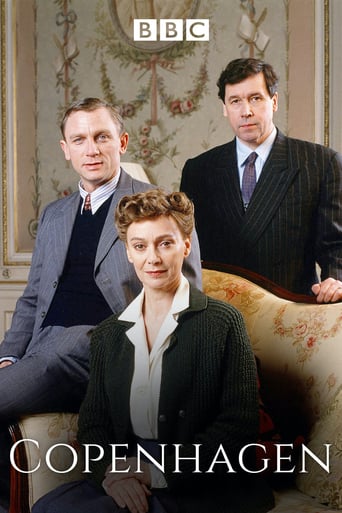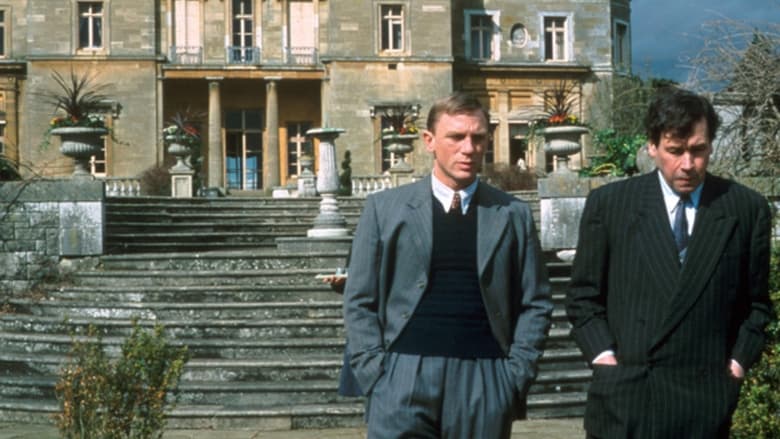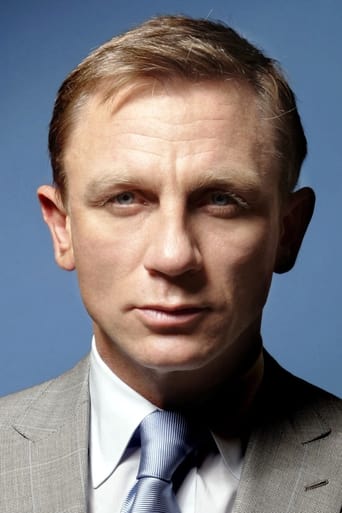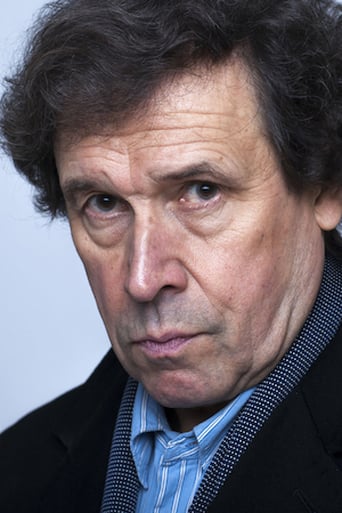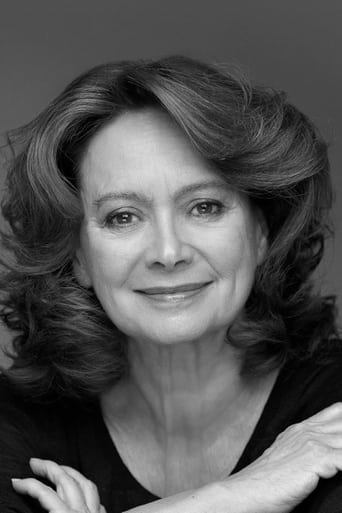Copenhagen (2002)
No one knows for sure what transpired when German physicist Werner Heisenberg met with his Jewish Danish counterpart, Niels Bohr, in Copenhagen -- the event became the stuff of modern scientific mythology. Director Howard Davies puts his spin on the momentous meeting that occurred one night in September 1941, during which the longtime friends entered into a dangerous discussion about physics and politics.
Watch Trailer
Free Trial Channels
Cast


Reviews
Self-important, over-dramatic, uninspired.
Far from Perfect, Far from Terrible
Beautiful, moving film.
Simple and well acted, it has tension enough to knot the stomach.
I awarded this presentation 4 stars. They are all for the script, which has been butchered beyond recognition in places. What can possibly be said? They took one of the finest plays written in the last century and methodically robbed it of its heart, humor and humanity. I don't really blame the actors, who are probably doing their best with shoddy direction and incomplete characters (because the very complete characters of the stage version have had their insides -- and insights -- ripped out). I do very much blame the director, who seems to strain to find ways to undermine the script. There are so many awkward pauses, awkwardly re-staged moments and awkwardly re-imagined line readings in this TV movie that at times, I forgot ever loving the play. I'm not one of these people who thinks that genius plays are automatically inferior on film (quite the contrary), but this particular genius play has been tremendously under-served by this outing. Now I hope they'll make a *real* film of this play. The world deserves it.
Occupied Copenhagen during the second world war is the stage for the meeting of colleagues Niels Bohr and Werner Heisenberg. Young Werner has come to talk to Niels. The former is leading the faltering German research programme into nuclear energy while the latter is the acknowledged as the leading expert in nuclear fission by the physics community. Years after the event this play brings Niels, Werner and Margrethe Bohr back together again to discuss their different interpretations of their meetings and their relative roles within the development of the ultimate weapon of mass destruction.Although this is not the most accessible play or subject, it is still a rather engaging film. My knowledge of the development of nuclear theory physics could be comfortably fitted onto the back of a postage stamp (and not one of those bigger, commemorative ones either) and I had never heard of any of these people or the theories they discussed in this film. But yet I understood the majority of it and found myself easily carried along by the dialogue. I imagine it would have been more interesting if I had had this knowledge but as it was it was still interesting. But it wasn't gripping or that engaging. By having the characters look backwards together the script does a good job of explaining the discussions and their wider ramifications to a degree. I say "to a degree" because I thought it could have done it better for someone like me, someone who knows nothing about anything when they press play for the first time.The dialogue is well written though, varying between explaining the theory and debating the morals well without ever making it seem forced again a strength of the "looking back" approach. Craig and Rae impress in their delivery but I would have liked more feeling to run through them. Annis stands up well with both the men and she is used well to provide insight from outside of the two main characters. Davies' direction is pretty good and retains the feel of a play without restricting the locations too much or making it feel stage bound.Overall then an interesting film but one that will have limited appeal and I understand why. It does well to make it accessible to viewers not familiar with the subject, although it still does have room for improvement as I wanted it to impact me more than it did. Worth a look though as something different which is well written and pretty interesting.
"Copenhagen" explores a little known meeting between two top physicists, one German and one Danish, from several perspectives, all of them speculative, during WWII when theoretical physics was on the threshold of unleashing the power of the atom and creating the ultimate weapon. Originally made for the more refined and heady tastes of PBS viewers, this film delves into the esoterics of this meeting of the minds asking more questions than it answers and in doing so delivers much food for thought. I was attracted to the film because I majored in physics in college and found this ensemble drama fascinating. However, I watched "Romy & Michele's High School Reunion" last night and found it much more entertaining. Recommended for those relative few interested in the history of physics. (B)Note - If you watch this film, don't miss the epilogue.
I saw Michael Frayn's stage play 'Copenhagen' in London ... in fact, I was technically *IN* the play, as Peter Davison's set design seated some of the audience members onstage directly above the actors, like a tribunal sitting in judgment, and I chose to watch the play from one of these onstage seats. (I also saw the play on Broadway in the same circumstances, so technically I was onstage during both productions.) This brilliant drama is basically an interplay of ideas between three highly intelligent minds: a concept which works better onstage than in a film or a teleplay. So, when 'Copenhagen' was adapted for television by the BBC, I was eager to see how they would 'open up' this story ... and whether or not the transition would work.It works astonishingly well. During the Second World War, brilliant young physicist Werner Heisenberg was in Germany, working towards the Nazi government's efforts to develop a nuclear bomb. Meanwhile, Heisenberg's older mentor and friend, Niels Bohr, was working quietly in his native Denmark (under Nazi occupation at the time) along with his wife Margrethe. Bohr's wife was not a trained physicist, but many people who knew the Bohrs stated that she was an active partner in his work, and that Mrs Bohr deserves to share credit for Bohr's achievements. In 1941, Heisenberg journeyed to Copenhagen to visit his old friends the Bohrs, although their disparate allegiances during the war had strained the friendship. To this day, historians debate why Heisenberg visited the Bohrs at this time. Also debated is Heisenberg's loyalty to the Nazi cause. Did Heisenberg actively try (and fail) to develop an atomic bomb for the Third Reich? Or was Heisenberg secretly an anti-Nazi who covertly harmed the German war effort by pretending to work on the bomb whilst sabotaging his labmates' efforts? As with the assassination of JFK, there are many different theories as to what 'really' happened here. Heisenberg devised the Uncertainty Principle of quantum physics, so it's ironic that we can never be certain about what really occurred in Copenhagen.The TV version of 'Copenhagen' is brilliant. The action is opened up by having Heisenberg journey to Copenhagen (on a vintage 1940s railway train) while an internal monologue plays on the soundtrack. When he meets the Bohrs, the three of them stroll through various (extremely beautiful) buildings and landmarks in Copenhagen, with an occasional Nazi soldier walking past to remind us that Denmark is effectively part of the Third Reich. The period detail is impeccable throughout, and the locations are a delight to look at.The script of this teleplay is actually superior to the stage version. In the stage play, after Bohr is identified as 'the pope of quantum physics', his wife replies: 'yes, you were the pope ... but Einstein was God'. This is a cheap joke, meant to raise a laugh from audience members who recognise Einstein yet who lack of knowledge of Bohr's achievements. With due respect to Einstein, the historical fact is that Niels Bohr achieved far more in the field of quantum physics than any other three scientists combined, including Einstein ... so I was grateful that the Einstein joke was removed here. (Einstein's achievements were in relativity, not quantum theory.) Another, much better line from the stage play is retained, when Heisenberg contemplates the concept of 'quantum morality' ... in other words, the journey from Good to Evil (or vice versa) can only be made in a single quantum leap, with no gradual transition from one state to the other. Intriguing!I wish that the script of 'Copenhagen' (stage or screen version) had included a crucial irony which was mentioned in the playbill of the London production: namely, that most of the important work in the development of the atomic bomb was achieved by Jewish scientists, precisely **because** of policies implemented by the Nazi government. In Nazi Germany, applied physics was considered a much more prestigious field of research than theoretical physics, so Jewish scientists were shut out of employment opportunities in the former, and they concentrated their research efforts in the latter ... which was the field that developed the atomic bomb.The excellent actor Stephen Rea does fine work as Bohr, and his castmates are splendid too. If you're looking for car chases or action sequences, 'Copenhagen' is not for you. But if you want to experience brilliant acting, sumptuous locales and an exchange of provoking ideas, then I recommend 'Copenhagen' ... and I rate this TV movie 10 points out of 10. This fascinating drama won't Bohr you. (Sorry, I couldn't resist!)

